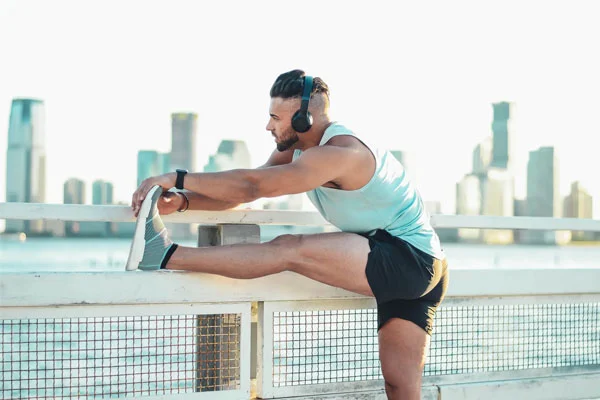Athletes, epitomizing dedication and perseverance, consistently push the boundaries of their physical capabilities in the relentless pursuit of excellence. Immersed in rigorous training regimens and fueled by a competitive spirit, athletes often find themselves teetering on the edge of their physical limits. Amidst this intense pursuit, the critical aspect of recovery occasionally takes a back seat. Nevertheless, it is precisely during these periods of recovery that the body rejuvenates, repairs, and strengthens, laying the foundation for continued athletic success.
Effective recovery is the linchpin that unlocks an athlete’s full potential and ensures sustained peak performance. Recognizing this, our exploration in this article will focus on indispensable recovery tips tailored explicitly to athletes. By delving into these strategies, we aim to provide insights that will not only optimize training routines but also contribute to injury prevention and elevate the overall well-being of athletes. It’s a holistic approach to recovery that goes beyond rest, addressing the nuanced needs of the body and mind, fostering resilience, and paving the way for enduring athletic excellence.
Prioritize Sleep for better Recovery
Sleep is the unsung hero of recovery. It is during sleep that the body repairs tissues, releases growth hormones, and consolidates memories. Athletes should aim for 7-9 hours of quality sleep per night to maximize the benefits of their training. Establishing a consistent sleep routine, creating a conducive sleep environment, and minimizing screen time before bedtime can significantly improve sleep quality.
Check out Swimming Training Camps in Antalya
Hydration is Non-Negotiable
Proper hydration is fundamental for athletic recovery. Sweating during intense workouts leads to fluid loss, which must be replenished to support muscle function and overall performance. Athletes should consume an adequate amount of water throughout the day, and for those engaged in prolonged or intense activities, electrolyte-rich drinks can help restore the body’s balance.
Nutrition as a Recovery Tool
Fueling your body with the right nutrients is crucial for recovery. Consuming a well-balanced diet rich in protein, carbohydrates, healthy fats, vitamins, and minerals aids in muscle repair, glycogen replenishment, and overall recovery. Consider incorporating post-workout meals or snacks that include a combination of protein and carbohydrates to optimize recovery.
Active Recovery Techniques
While rest days are essential, incorporating active recovery techniques can enhance overall recovery. Activities like yoga, swimming, or light cycling promote blood circulation, reduce muscle stiffness, and contribute to mental relaxation. These activities help athletes stay mobile during recovery periods without putting additional strain on their bodies.
Embrace Ice Baths and Contrast Therapy
Cold exposure through ice baths or contrast therapy (alternating between hot and cold water) is a popular recovery method among athletes. These techniques help reduce inflammation, alleviate muscle soreness, and improve circulation. However, it’s essential to listen to your body and consult with a healthcare professional before incorporating these methods, as they may not be suitable for everyone.
Read more: What is a training program?
Invest in Professional Support for Recovery
Athletes should consider building a support team, including physiotherapists, massage therapists, and nutritionists. Regular check-ins with these professionals can help identify potential issues, address imbalances, and tailor recovery strategies to individual needs. Professional support ensures a comprehensive approach to your well-being.
Mental Recovery Matters
Recovery isn’t solely physical; mental well-being is equally crucial. Incorporate mindfulness practices, meditation, or visualization techniques to manage stress, improve focus, and promote a positive mindset. Balancing mental and emotional recovery with physical recovery is the key to sustained athletic success.
Best Recovery for Athletes
Athletes, with their relentless pursuit of excellence and commitment to pushing physical boundaries, often require meticulous recovery strategies to ensure peak performance and prevent burnout. The art of recovery goes beyond mere rest; it involves a holistic approach that encompasses physical, mental, and emotional well-being. In this article, we explore some of the best recovery strategies tailored to athletes, designed to enhance performance, reduce the risk of injuries, and promote overall longevity in their athletic journey.
Check out Football Training Camps in Antalya
Quality Sleep
The significance of quality sleep cannot be overstated in the realm of athletic recovery. During sleep, the body undergoes essential processes such as muscle repair, hormone release, and memory consolidation. Athletes should prioritize 7-9 hours of uninterrupted sleep per night, aiming for a consistent sleep schedule and creating a conducive sleep environment. Quality sleep sets the foundation for optimal physical and mental recovery.
Nutrition as Fuel
Fueling the body with the right nutrients is paramount for athletes. A well-balanced diet rich in proteins, carbohydrates, healthy fats, vitamins, and minerals aids in muscle repair, glycogen replenishment, and overall recovery. Athletes should pay attention to nutrient timing, ensuring they consume the right nutrients before, during, and after training sessions to support energy levels and facilitate recovery.
Active Recovery
Contrary to popular belief, recovery doesn’t always mean complete rest. Active recovery involves engaging in low-intensity exercises like swimming, cycling, or yoga. These activities promote blood circulation, reduce muscle stiffness, and enhance flexibility without putting excessive strain on the body. Integrating active recovery into training schedules helps athletes stay mobile and expedite the recovery process.
Professional Support
Seeking support from healthcare professionals, such as physiotherapists, massage therapists, and nutritionists, is a hallmark of effective recovery. Regular check-ups and consultations with these experts can identify potential issues, address imbalances, and customize recovery plans based on individual needs. Professional support ensures a comprehensive and personalized approach to an athlete’s well-being.
Advanced Technology
Embracing technological advancements in recovery tools has become commonplace among elite athletes. From cryotherapy chambers to compression therapy devices, technology offers innovative solutions to accelerate recovery. These tools aid in reducing inflammation, promoting muscle recovery, and preventing injuries. However, it’s crucial to integrate these technologies under professional guidance.
Mental Recovery Practices
Athletic prowess is not only about physical strength but also mental resilience. Incorporating mental recovery practices such as mindfulness, meditation, and visualization techniques can enhance focus, reduce stress, and promote a positive mindset. Mental well-being is a cornerstone of overall athletic performance, and addressing it is integral to sustaining success in the long run.
Periodization and Rest
Structured training programs that incorporate periodization – the strategic planning of training phases – allow athletes to balance intensity and recovery. Scheduled rest days and deload weeks are essential components of effective recovery. These intentional breaks provide the body with the necessary time to repair and adapt, preventing overtraining and reducing the risk of injuries.
Conclusion
In the relentless pursuit of athletic achievement, recovery is the linchpin that holds the intricate machinery of peak performance together. By prioritizing sleep, maintaining proper hydration and nutrition, incorporating active recovery, embracing recovery techniques, seeking professional support, and addressing mental well-being, athletes can optimize their recovery process. Remember, it’s not just about training hard but also recovering smart. So, unlock your potential by giving your body the recovery it deserves and step into each competition stronger, more resilient, and ready to conquer new heights.
FAQs
- Why is recovery essential for athletes?
Recovery is crucial for athletes because it allows the body to repair and adapt to the stresses placed on it during training and competition. Adequate recovery helps prevent burnout, reduces the risk of injuries, and ensures sustained peak performance. Without proper recovery, athletes may experience fatigue, decreased performance, and an increased likelihood of overuse injuries.
- How does sleep impact athletic recovery?
Quality sleep is a cornerstone of effective recovery for athletes. During sleep, the body releases growth hormones, repairs tissues, and consolidates memories. Lack of sleep can hinder these processes, leading to decreased physical and cognitive performance. Establishing consistent sleep patterns and prioritizing sufficient sleep duration is essential for athletes looking to optimize their recovery.
- What role does nutrition play in athlete recovery?
Nutrition is a critical factor in athlete recovery as it provides the necessary fuel for energy, muscle repair, and overall well-being. Consuming a well-balanced diet with adequate proteins, carbohydrates, healthy fats, vitamins, and minerals supports muscle recovery, replenishes glycogen stores, and enhances the body’s ability to bounce back after intense workouts. Proper nutrient timing, especially around training sessions, is key for optimal recovery.
- Are there specific recovery techniques that athletes should prioritize?
Yes, athletes can benefit from various recovery techniques. Active recovery, such as low-intensity exercises, promotes blood circulation and reduces muscle stiffness. Professional support from physiotherapists, massage therapists, and nutritionists can address specific needs and imbalances. Additionally, technologies like cryotherapy and compression therapy have gained popularity for their role in reducing inflammation and expediting muscle recovery. Finding a personalized combination of these techniques is often the key to effective recovery for athletes.


